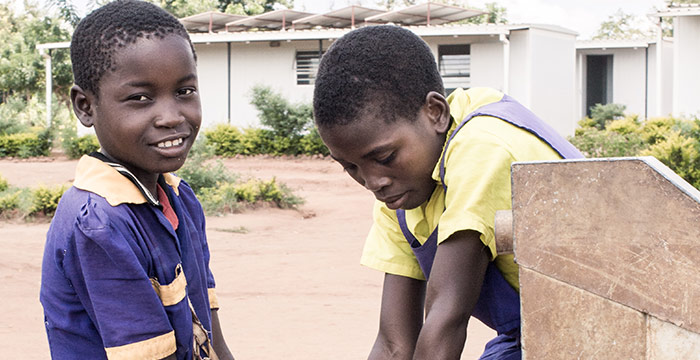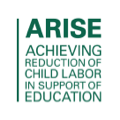
Zambia, Africa
A recipe for sustainable development
School meal program provides more than food
The TABLE FOR TWO school meal program provides food, solar power, irrigation, and opportunities for education, all of which are keeping children in school and reducing their vulnerability to child labor. At the same time, the program is also contributing to food security and community self-sufficiency – it’s a sustainable development success story.
TABLE FOR TWO is proving to be key in retaining children at school in Malawi and Zambia after they have been withdrawn from child labor by the ARISE Program. Chimwemwe Njanji, Field Coordinator, Winrock International says, “School feeding programs are very important. They help to get children into school and to keep them there.” Parents are encouraged to send their children to school because they know they children will receive a nutritious meal, whilst at home they may go hungry. But the gardens also provide other benefits to the children at school. They’ve become a source of clean drinking water due to the irrigation facilities that accompany the construction of the gardens, and they provide an outside classroom for learning about nutrition, agriculture and the environment. The students are allocated a small piece of land, and they use it to participate in land preparation, the planting of seeds, watering, harvesting and other crop husbandry practices – it’s a place to apply the theory they learn.
But it’s not only the school students that benefit from the gardens. Surrounding communities are also learning new agricultural skills because the gardens double-up as demonstration plots. By participating in the garden activities, local community members are learning about appropriate crop growing spacing, irrigation and water management, and disease and pest management. Some of them have already started to apply their new knowledge and skills in their own gardens. Auspad Chisale, a chairperson for the school garden committee at Kampanje School said, “With the crop management knowledge and skills that I gained through the program, I can now grow any crop of my wish in my own garden. The livelihood of my family has improved because of this project”.
On an even broader scale these gardens are also contributing to food security, sustainable development and are creating a cycle of self-reliance. “This is an innovative and sustainable school garden which continues providing valuable school meals and a variety of benefits to the community. We are excited to see more students start their important first step towards a brighter future.” said Mayumi Uejima-Carr, Co-President of TABLE FOR TWO USA. Some of the fruits and vegetables grown in the school gardens are sold in local produce markets, and with the money earned, maize and soya beans are purchased. These are then dried and stored at schools in 50kg bags. Over time, they are then processed into a blend of corn and soya flour, which is used by volunteer women to prepare porridge for school meals. More children attend school and education improves, more gardens are tended and more crops produced and sold. And so the cycle continues.


School meals from the school gardens




